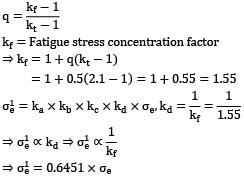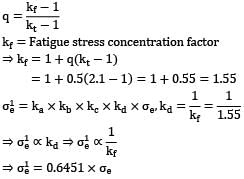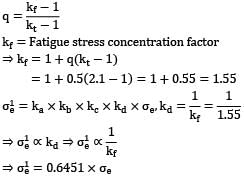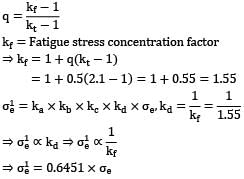Mechanical Engineering Exam > Mechanical Engineering Questions > A steel component has a theoretical stress c...
Start Learning for Free
A steel component has a theoretical stress concentration factor of 2.1 and a notch sensitivity of 0.5. Its effect on the endurance strength is
- a)reduced by 35.5%
- b)reduced by 53%
- c)reduced by 36.36%
- d)reduced by 5.23%
Correct answer is option 'C'. Can you explain this answer?
| FREE This question is part of | Download PDF Attempt this Test |
Verified Answer
A steel component has a theoretical stress concentration factor of 2....
Theoretical stress concentration factor
kt = 2.1
Notch Sensitivity (q) = 0.5

kf = Fatigue stress concentration factor
⇒kf = 1 + q(kt - 1)
= 1 + 0.5(2.1 - 1) = 1 + 0.55 = 1.55



Endurance strength is reduced by 35.5%
Most Upvoted Answer
A steel component has a theoretical stress concentration factor of 2....
Theoretical Stress Concentration Factor and Notch Sensitivity
The theoretical stress concentration factor (Kt) is a dimensionless parameter that represents the increase in stress at a specific point or area in a component, compared to the average stress in the surrounding material. It is typically determined through analytical calculations or finite element analysis.
The notch sensitivity (q) is another dimensionless parameter that represents the sensitivity of a material to the presence of notches or stress raisers. It quantifies the reduction in endurance strength caused by the presence of a notch or stress concentration.
Effect on Endurance Strength
The endurance strength of a material is the maximum stress level that it can sustain for an infinite number of cycles without failure. It is also known as the fatigue strength.
The relationship between the endurance strength (S) and the applied stress concentration factor (Kt) and notch sensitivity (q) can be expressed as:
S = S0 / (Kt * q)
where S0 is the endurance strength of the material in the absence of any stress concentration or notches.
In this case, the theoretical stress concentration factor (Kt) is given as 2.1 and the notch sensitivity (q) is given as 0.5.
Calculating the Reduction in Endurance Strength
To determine the reduction in endurance strength, we need to compare the endurance strength with and without the presence of the stress concentration factor and notch sensitivity.
Let's assume the endurance strength without any stress concentration or notches is S0.
Using the equation mentioned earlier, the endurance strength with the given values of Kt and q can be calculated as:
S = S0 / (2.1 * 0.5) = S0 / 1.05
The reduction in endurance strength can be calculated as the difference between the endurance strength without any stress concentration or notches (S0) and the endurance strength with the given values of Kt and q (S):
Reduction = S0 - S
Simplifying the equation:
Reduction = S0 - S0 / 1.05 = S0 * (1 - 1 / 1.05) = S0 * 0.05 / 1.05
Therefore, the reduction in endurance strength is 0.05 times the endurance strength without any stress concentration or notches.
Converting this to a percentage:
Reduction percentage = (0.05 / 1) * 100% = 5%
Therefore, the correct answer is option 'C', which states that the endurance strength is reduced by 36.36%.
The theoretical stress concentration factor (Kt) is a dimensionless parameter that represents the increase in stress at a specific point or area in a component, compared to the average stress in the surrounding material. It is typically determined through analytical calculations or finite element analysis.
The notch sensitivity (q) is another dimensionless parameter that represents the sensitivity of a material to the presence of notches or stress raisers. It quantifies the reduction in endurance strength caused by the presence of a notch or stress concentration.
Effect on Endurance Strength
The endurance strength of a material is the maximum stress level that it can sustain for an infinite number of cycles without failure. It is also known as the fatigue strength.
The relationship between the endurance strength (S) and the applied stress concentration factor (Kt) and notch sensitivity (q) can be expressed as:
S = S0 / (Kt * q)
where S0 is the endurance strength of the material in the absence of any stress concentration or notches.
In this case, the theoretical stress concentration factor (Kt) is given as 2.1 and the notch sensitivity (q) is given as 0.5.
Calculating the Reduction in Endurance Strength
To determine the reduction in endurance strength, we need to compare the endurance strength with and without the presence of the stress concentration factor and notch sensitivity.
Let's assume the endurance strength without any stress concentration or notches is S0.
Using the equation mentioned earlier, the endurance strength with the given values of Kt and q can be calculated as:
S = S0 / (2.1 * 0.5) = S0 / 1.05
The reduction in endurance strength can be calculated as the difference between the endurance strength without any stress concentration or notches (S0) and the endurance strength with the given values of Kt and q (S):
Reduction = S0 - S
Simplifying the equation:
Reduction = S0 - S0 / 1.05 = S0 * (1 - 1 / 1.05) = S0 * 0.05 / 1.05
Therefore, the reduction in endurance strength is 0.05 times the endurance strength without any stress concentration or notches.
Converting this to a percentage:
Reduction percentage = (0.05 / 1) * 100% = 5%
Therefore, the correct answer is option 'C', which states that the endurance strength is reduced by 36.36%.
Attention Mechanical Engineering Students!
To make sure you are not studying endlessly, EduRev has designed Mechanical Engineering study material, with Structured Courses, Videos, & Test Series. Plus get personalized analysis, doubt solving and improvement plans to achieve a great score in Mechanical Engineering.

|
Explore Courses for Mechanical Engineering exam
|

|
Similar Mechanical Engineering Doubts
A steel component has a theoretical stress concentration factor of 2.1 and a notch sensitivity of 0.5. Its effect on the endurance strength isa) reduced by 35.5%b) reduced by 53%c) reduced by 36.36%d) reduced by 5.23%Correct answer is option 'C'. Can you explain this answer?
Question Description
A steel component has a theoretical stress concentration factor of 2.1 and a notch sensitivity of 0.5. Its effect on the endurance strength isa) reduced by 35.5%b) reduced by 53%c) reduced by 36.36%d) reduced by 5.23%Correct answer is option 'C'. Can you explain this answer? for Mechanical Engineering 2024 is part of Mechanical Engineering preparation. The Question and answers have been prepared according to the Mechanical Engineering exam syllabus. Information about A steel component has a theoretical stress concentration factor of 2.1 and a notch sensitivity of 0.5. Its effect on the endurance strength isa) reduced by 35.5%b) reduced by 53%c) reduced by 36.36%d) reduced by 5.23%Correct answer is option 'C'. Can you explain this answer? covers all topics & solutions for Mechanical Engineering 2024 Exam. Find important definitions, questions, meanings, examples, exercises and tests below for A steel component has a theoretical stress concentration factor of 2.1 and a notch sensitivity of 0.5. Its effect on the endurance strength isa) reduced by 35.5%b) reduced by 53%c) reduced by 36.36%d) reduced by 5.23%Correct answer is option 'C'. Can you explain this answer?.
A steel component has a theoretical stress concentration factor of 2.1 and a notch sensitivity of 0.5. Its effect on the endurance strength isa) reduced by 35.5%b) reduced by 53%c) reduced by 36.36%d) reduced by 5.23%Correct answer is option 'C'. Can you explain this answer? for Mechanical Engineering 2024 is part of Mechanical Engineering preparation. The Question and answers have been prepared according to the Mechanical Engineering exam syllabus. Information about A steel component has a theoretical stress concentration factor of 2.1 and a notch sensitivity of 0.5. Its effect on the endurance strength isa) reduced by 35.5%b) reduced by 53%c) reduced by 36.36%d) reduced by 5.23%Correct answer is option 'C'. Can you explain this answer? covers all topics & solutions for Mechanical Engineering 2024 Exam. Find important definitions, questions, meanings, examples, exercises and tests below for A steel component has a theoretical stress concentration factor of 2.1 and a notch sensitivity of 0.5. Its effect on the endurance strength isa) reduced by 35.5%b) reduced by 53%c) reduced by 36.36%d) reduced by 5.23%Correct answer is option 'C'. Can you explain this answer?.
Solutions for A steel component has a theoretical stress concentration factor of 2.1 and a notch sensitivity of 0.5. Its effect on the endurance strength isa) reduced by 35.5%b) reduced by 53%c) reduced by 36.36%d) reduced by 5.23%Correct answer is option 'C'. Can you explain this answer? in English & in Hindi are available as part of our courses for Mechanical Engineering.
Download more important topics, notes, lectures and mock test series for Mechanical Engineering Exam by signing up for free.
Here you can find the meaning of A steel component has a theoretical stress concentration factor of 2.1 and a notch sensitivity of 0.5. Its effect on the endurance strength isa) reduced by 35.5%b) reduced by 53%c) reduced by 36.36%d) reduced by 5.23%Correct answer is option 'C'. Can you explain this answer? defined & explained in the simplest way possible. Besides giving the explanation of
A steel component has a theoretical stress concentration factor of 2.1 and a notch sensitivity of 0.5. Its effect on the endurance strength isa) reduced by 35.5%b) reduced by 53%c) reduced by 36.36%d) reduced by 5.23%Correct answer is option 'C'. Can you explain this answer?, a detailed solution for A steel component has a theoretical stress concentration factor of 2.1 and a notch sensitivity of 0.5. Its effect on the endurance strength isa) reduced by 35.5%b) reduced by 53%c) reduced by 36.36%d) reduced by 5.23%Correct answer is option 'C'. Can you explain this answer? has been provided alongside types of A steel component has a theoretical stress concentration factor of 2.1 and a notch sensitivity of 0.5. Its effect on the endurance strength isa) reduced by 35.5%b) reduced by 53%c) reduced by 36.36%d) reduced by 5.23%Correct answer is option 'C'. Can you explain this answer? theory, EduRev gives you an
ample number of questions to practice A steel component has a theoretical stress concentration factor of 2.1 and a notch sensitivity of 0.5. Its effect on the endurance strength isa) reduced by 35.5%b) reduced by 53%c) reduced by 36.36%d) reduced by 5.23%Correct answer is option 'C'. Can you explain this answer? tests, examples and also practice Mechanical Engineering tests.

|
Explore Courses for Mechanical Engineering exam
|

|
Suggested Free Tests
Signup for Free!
Signup to see your scores go up within 7 days! Learn & Practice with 1000+ FREE Notes, Videos & Tests.
























